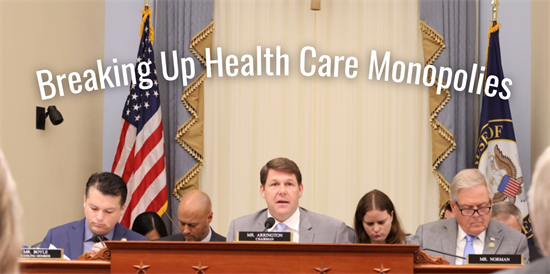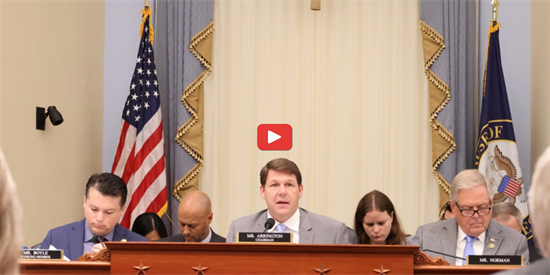Press Releases
Arrington Holds Budget Hearing on Breaking Up Health Care Monopolies
Washington,
May 23, 2024
Tags:
Healthcare
WASHINGTON, D.C. – Today, House Budget Chairman Jodey Arrington (TX-19) held a hearing titled “Breaking Up Health Care Monopolies: Examining the Budgetary Effects of Health Care Consolidation,” during which the Committee focused on the budgetary effects of increasing health care consolidation and explored policy solutions to enhance competition, reduce health care costs, and expand patient choices.
Chairman Arrington’s Remarks as Prepared: Our national debt is approaching $35 trillion, and we are adding almost $8 billion to the debt every day. Today, our gross debt to GDP is 123.5%. After WWII it was 118%. Even worse, so far this year, we pay 58 cents on every dollar just to service the debt and we have spent more on interest payments than on Medicare and national security respectively. This trajectory is unsustainable and is the biggest threat facing our Nation. In order to Reverse the Curse we must address the biggest driver of our debt: federal health care spending. In fact, the Congressional Budget Office (CBO) projects that spending on major health care programs will nearly double and grow from $1.7 trillion in 2024 to $3.2 trillion in 2034, three times larger than the amount projected to be spent on national defense in the same year. National health expenditures, which include everything from patient out-of-pocket costs to federal and state spending on major health care programs, are projected to grow faster than the economy over the next decade,rising from $4.5 trillion or 17.3 percent of gross domestic product (GDP) in 2022 to $7.2 trillion or nearly 20 percent of GDP by 2031. Health care spending is expected to grow 5.4% over the next ten years, while GDP will grow 4.6%. Simply put, this is neither sustainable for the federal budget nor for patients and taxpayers. This hearing is important. Today we are focusing on one of the key issues plaguing our broken health care system and driving increased federal spending: increased consolidation in health care markets. Big medicine consolidation across health care markets – ranging from hospitals purchasing independent physician offices, to insurance companies acquiring pharmacy benefit managers (PBMs) and even pharmacies in a growing trend of vertical integration, to pharmaceutical companies gaming the patent system boxing out competition – has been accelerating in recent years. The data spells out a troublesome picture of the current state of health care markets and the impact of consolidation on spending. In fact, CBO stated that consolidation has increased federal health spending and costs for patients, while also limiting choices and decreasing patient access to quality care. There were over 1,000 hospital mergers between 2002 and 2020, and research has revealed the average price of hospital services increases by $521 after a hospital merger occurs. Additionally, 41 percent of physicians are now vertically integrated with a hospital or health systems, an increase of 12 percent over ten years. In cancer care alone, over 700 independent cancer clinics were acquired by hospitals from 2008 – 2020. The cause and effect of this is clear: prices for physician services in areas with high market concentration are between 14 and 30 percent higher than in areas with less consolidation. And in the prescription drug supply chain, 79% of all drug claims are now processed by three pharmacy benefit managers (PBMs), all of which are vertically integrated into large health insurance companies. This vertical consolidation – which investors and executives say will build and scale a more integrated health care system will, in reality, shift incentives and increase drug costs for Americans. The House Budget Committee and the House Republican conference have been leading the way to combat health care consolidation through policies in our Fiscal Year 2025 Reverse the Curse Budget such as site neutral payment reform. Equalizing payments for the same service through Medicare site neutral reform—while ensuring our rural providers are unaffected—is not only commonsense, it would save taxpayers over $150 billion dollars over the 10-year budget window. More importantly, this policy would end the perverse incentive that is leading to hospitals acquiring independent physician offices, leaving the market with less competition and patients with few choices. Most importantly, our reforms will ensure seniors will pay less in out-of-pocket costs. Lastly, the House Republican Lower Costs, More Transparency Act that passed the House last December, not only includes transparency reforms to improve the health care market, but it also includes site-neutral payments for Part B physician-administered drugs. As Chairman, I have made clear that this Committee takes its fiduciary duty to taxpayers seriously. That is why we will examine the effects of rising consolidation on the budget and discuss the reform necessary to reverse this trend, restore market competition, and reduce health care spending for the American people. ### |



